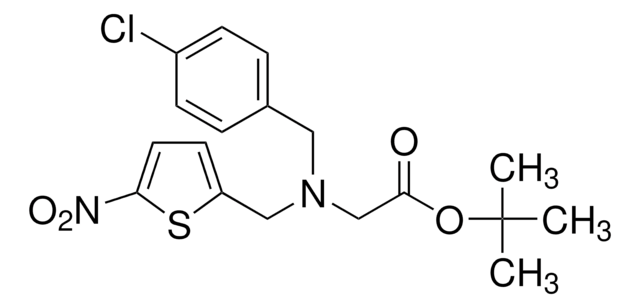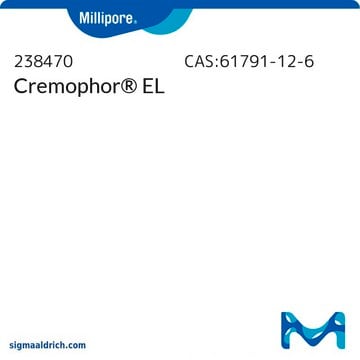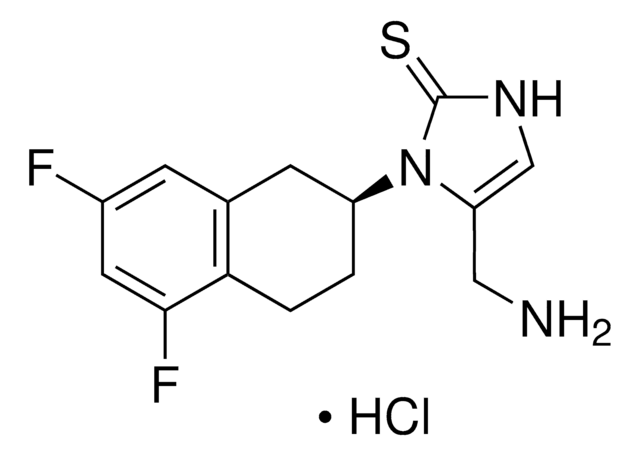SML2067
SR9011
≥98% (HPLC)
Synonym(s):
3-[[[(4-Chlorophenyl)methyl][(5-nitro-2-thienyl)methyl]amino]methyl]-N-pentyl-1-pyrrolidinecarboxamide
Sign Into View Organizational & Contract Pricing
All Photos(1)
About This Item
Empirical Formula (Hill Notation):
C23H31ClN4O3S
CAS Number:
Molecular Weight:
479.04
UNSPSC Code:
12352200
NACRES:
NA.77
Recommended Products
Assay
≥98% (HPLC)
form
powder
color
white to beige
solubility
DMSO: 2 mg/mL, clear
storage temp.
−20°C
Application
SR9011 has been used as a nuclear receptor subfamily 1 group D member 1 (NR1D1) receptor agonist:
- to study its effects on microglial immune-metabolism
- to study its effects on insulin secretion from human type 2 diabetes islet cells
- to study its effects on thyroid-stimulating hormone β (TSHβ) gene expression
Biochem/physiol Actions
SR9011 is a potent nuclear receptor REV-ERB agonist (EC50 of REV-ERBα- and REV-ERBβ-dependent repressor activity = 790 and 560 nM, respectively, by cell-based reporter assay) that stimulates REV-ERB-dependent target genes suppression both in cultures in vitro and in mice in vivo (100 mg/kg i.p., b.i.d.) without activity toward a panel of 46 other nuclear receptors. SR9011 is shown to modulate circadian behavior by suppressing the transcription factors BMAL1 (brain and muscle ARNT-like protein 1) and CLOCK (circadian locomotor output cycles kaput) as well as induce energy expenditure and weight loss by regulating genes involved in lipid and glucose metabolism in mice in vivo with good bioavailabiilty (plasma conc. = 0.53 and 15.3 μM 2 hr post 10 or 100 mg/kg i.p. dosage; brain conc. = 0.24 μM 2 hr post 10 mg/kg i.p.), while its structure analog GSK4112 shows no plasma exposure.
Signal Word
Warning
Hazard Statements
Precautionary Statements
Hazard Classifications
Eye Irrit. 2 - Skin Irrit. 2
Storage Class Code
11 - Combustible Solids
WGK
WGK 3
Flash Point(F)
Not applicable
Flash Point(C)
Not applicable
Certificates of Analysis (COA)
Search for Certificates of Analysis (COA) by entering the products Lot/Batch Number. Lot and Batch Numbers can be found on a product’s label following the words ‘Lot’ or ‘Batch’.
Already Own This Product?
Find documentation for the products that you have recently purchased in the Document Library.
Sadichha Sitaula et al.
Biochemical pharmacology, 131, 68-77 (2017-02-19)
REV-ERBα and REV-ERBβ are heme regulated nuclear receptors that are known to regulate metabolic pathways. We previously demonstrated that treatment of mice with synthetic REV-ERB agonists suppressed plasma cholesterol levels and the hepatic levels of the rate limiting enzyme in
Laura A Solt et al.
Nature, 485(7396), 62-68 (2012-03-31)
Synchronizing rhythms of behaviour and metabolic processes is important for cardiovascular health and preventing metabolic diseases. The nuclear receptors REV-ERB-α and REV-ERB-β have an integral role in regulating the expression of core clock proteins driving rhythms in activity and metabolism.
Irene O Aninye et al.
The Journal of biological chemistry, 289(24), 17070-17077 (2014-05-06)
Thyroid hormones (TH) are critical for development, growth, and metabolism. Circulating TH levels are tightly regulated by thyroid-stimulating hormone (TSH) secretion within the hypothalamic-pituitary-thyroid axis. Although circadian TSH secretion has been well documented, the mechanism of this observation remains unclear.
Ryota Nakazato et al.
Glia, 65(1), 198-208 (2016-10-12)
Similar to neurons, microglia have an intrinsic molecular clock. The master clock oscillator Bmal1 modulates interleukin-6 upregulation in microglial cells exposed to lipopolysaccharide. Bmal1 can play a role in microglial inflammatory responses. We previously demonstrated that gliotransmitter ATP induces transient
Volodymyr Petrenko et al.
Proceedings of the National Academy of Sciences of the United States of America, 117(5), 2484-2495 (2020-01-23)
Circadian clocks operative in pancreatic islets participate in the regulation of insulin secretion in humans and, if compromised, in the development of type 2 diabetes (T2D) in rodents. Here we demonstrate that human islet α- and β-cells that bear attenuated
Our team of scientists has experience in all areas of research including Life Science, Material Science, Chemical Synthesis, Chromatography, Analytical and many others.
Contact Technical Service









